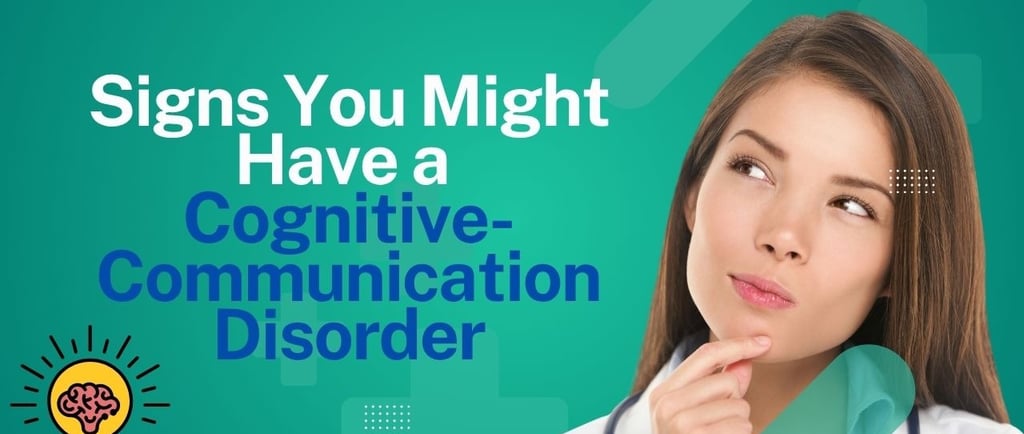Online Speech Therapy Platform
Signs You Might Have a Cognitive-Communication Disorder
Recognizing When Everyday Communication Becomes a Challenge
COGNITIVE-COMMUNICATION DISORDERS
7/23/20252 min read


🧠 Introduction
Do you ever struggle to organize your thoughts, forget what you were about to say, or find it hard to follow conversations? While occasional forgetfulness is normal, frequent communication difficulties could be a sign of a Cognitive-Communication Disorder (CCD) — especially after a stroke, brain injury, or neurological illness.
In this blog post, we’ll explore the early signs of cognitive-communication disorders, how they affect everyday life, and when to seek help from a speech-language pathologist.
❓ What Is a Cognitive-Communication Disorder?
A Cognitive-Communication Disorder occurs when brain-based impairments affect your ability to think, remember, organize, and express ideas clearly. Unlike speech sound issues (like stuttering or slurred speech), CCDs involve the mental processes behind communication, such as attention, memory, reasoning, and problem-solving.
🚨 Common Signs and Symptoms
If you or a loved one has been experiencing the following issues — especially after a brain injury, stroke, or neurodegenerative condition — it may be time to seek a professional evaluation.
🧩 Thinking and Problem-Solving
Difficulty following instructions or steps
Trouble analyzing situations or solving everyday problems
Getting stuck on one idea (perseveration)
🧠 Memory and Attention
Forgetting names, appointments, or what was just said
Losing track of conversations or tasks
Struggling to pay attention in noisy environments
🗣️ Language and Expression
Difficulty finding the right words
Disorganized or off-topic speech
Repeating yourself without realizing it
🤝 Social Communication
Interrupting others or talking off-topic
Misunderstanding jokes, tone, or facial expressions
Struggling to follow group conversations
🏠 Real-Life Examples
Imagine trying to pay a bill online but forgetting your password, losing track of what you’re doing halfway, or entering the wrong information multiple times. Now imagine this happening across conversations, daily tasks, and social settings — that's what living with a CCD can feel like.
👩⚕️ When to Seek Help
If these signs are persistent and interfere with daily life, it's time to consult a speech-language pathologist (SLP). Early diagnosis can lead to effective therapy and help restore confidence and independence.
Online therapy platforms like Tellomeet provide convenient, expert-led care for adults facing cognitive-communication challenges due to stroke, brain injury, or neurological disorders.
🧠 Therapy Can Help
A certified SLP can provide:
Cognitive exercises for memory and focus
Communication strategies to stay on topic
Compensatory tools like note-taking or visual aids
Family training to support everyday communication
✅ Conclusion
Cognitive-communication disorders are often invisible but deeply affect everyday life. If you recognize these signs in yourself or someone you care about, don't ignore them. Support is available, and therapy can make a real difference.
